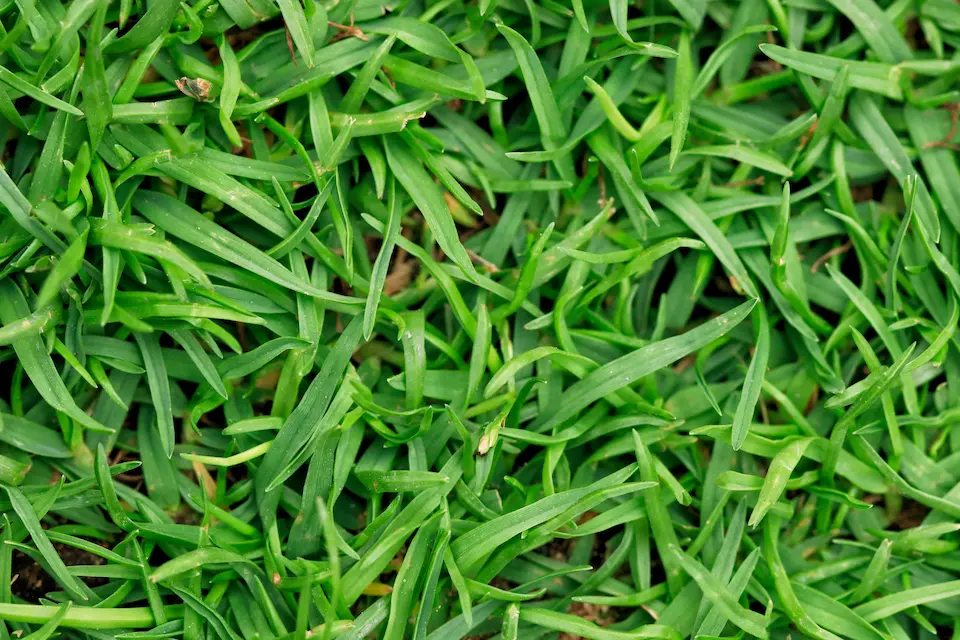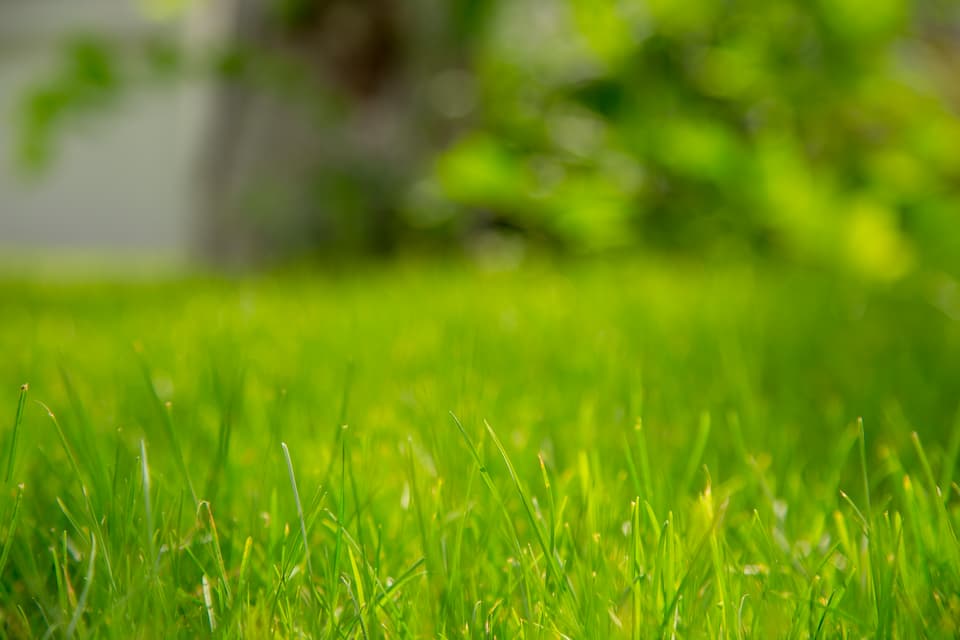
Bermuda grass is a warm-season grass, making it optimal in North Carolina and southern regions of the country. Bermuda lawns are known for their ability to tolerate difficult conditions like drought, heat, and plenty of foot traffic. It’s a favorite because it recovers from damage much quicker than other types of grass.
To keep your Bermuda grass lawn vibrant and plush, you need to be vigilant about taking care of it. At FortSmith Landscaping, our lawn care team has extensive experience when it comes to Bermuda grass maintenance. We’ve compiled this guide to help you better care for your Bermuda grass lawn all year long in North Carolina.
The Best Time & Place to Plant Bermuda Grass
Since Bermuda grass is a warm-season grass, it grows during the spring and summer and then turns brown in fall and winter as it goes dormant. During the growing season, Bermuda grass can be planted by seeding or laying sod. The fine to medium-texture blades of Bermuda grass have pointed tips and are relatively wide. This helps to create a dense, deep carpet of grass.
When to Plant Bermuda Grass
The best time to plant Bermuda grass is during the spring, after the final frost. Since it is a warm-season grass, the seed germinates best in soil temperatures above 65 degrees Fahrenheit. Also, look to see that the air temperatures remain above 80 degrees during the day for the best results.
Where to Plant Bermuda Grass
Bermuda grass thrives in slightly acidic soil. That’s a pH level from about 6 to 7. It can also tolerate some levels of alkaline soil. You can test the soil to determine the pH and see if you have optimal conditions. Also, be sure that your Bermuda grass has well-draining ground. This is critical to proper growth.
How Much Grass Seed Do You Need?
The amount of Bermuda grass seed you’ll need will depend on whether you are seeding a new lawn or trying to overseed an existing lawn. The directions on the seed bag will tell you how much seed you’ll need to cover your area and the spreading rate. The larger the area, the more seed you’ll need.
If you’re new to seeding and taking care of your Bermuda grass lawn, the pros at FortSmith Landscaping can work on seeding your lawn to ensure it has the right amount of seed. We can also maintain it throughout the year so that it is always receiving the care it needs to thrive.
The Role of Sunlight and Bermuda Grass Growth
The sun plays a big role when it comes to Bermuda grass growth. It requires full sun to grow well. It’s recommended that your lawn gets at least 7 hours of full sunlight daily. Shaded areas behind trees or between houses that would be considered full sun can lead to thin Bermuda grass.
If your lawn doesn’t receive a lot of sun, look for varieties of Bermuda grass that require less sunlight. These types of Bermuda grass will still need 4-5 hours of direct sunlight. Remember, if you want an actively growing Bermuda grass lawn, sunlight is the answer! If you have shady areas, you can also look for shade-tolerant plants to supplement your lawn and make it look fuller.

Bermuda Grass Care & Maintenance
Bermuda grass care and maintenance is a year-long job if you want your lawn to be the envy of the neighborhood. Consider these care and maintenance tips for southern lawns to thrive:
Mowing
During the summer and into the fall, keep your Bermuda grass healthy by mowing it once or twice a week, depending on how much it grows. Keep the grass blades at a height of about 1.5 inches. You don’t want to cut it too short. Also, rake or bag the lawn debris, and compost any clippings.
Water
Bermuda grass is drought resistant. The more water it is given when there is no drought, the better it will be able to deal with conditions when there is minimal water. Water your grass every few days when the weather has warmed to springlike conditions. This will keep it healthy and thriving.
Winter Cleaning and Dethatching
Just because it says winter on the calendar doesn’t mean you don’t have to take care of your lawn. In warmer regions around late January, you’ll want to start thinking about dealing with thatch buildup and winter cleaning. You can use a dethatcher to take care of leftover grass from the dormant season. This will help with growth.
Core Aeration
Towards March and April, you’ll want to start planning to core aerate your lawn. This is important because it prevents soil compaction and helps to increase drainage. Aeration can be done with a push tool, either powered or manual.
Weed Control
Warmer temperatures and season changes mean it’s time for weed control. If you want to get ahead and avoid an invasive weed problem, consider using different herbicides throughout the year. You’ll want to start with the first application of pre-emergent herbicide in the late winter months.
The second application should be done 2-3 months later. A post-emergent herbicide is then used. Be sure to read the labels so that whatever product you’re using will not harm or kill Bermuda grass.
Pest Control
When it comes to pests, you shouldn’t have to worry much about your Bermuda grass lawn. But you may notice some insects from time to time. Usually, grubs are to blame. You can check how many grubs are around your lawn by cutting a sharp spade into your lawn. Remove a square foot section. If you see five or more grubs in one square foot section, use lawn insecticide made for grub control.
Fertilizing
A soil test is a great way to determine whether your lawn needs fertilizer. This will tell you all you need to know about what nutrients your grass needs to thrive.
Fertilizing Bermuda grass is essential in ensuring a lush, healthy lawn. It’s important to use a balanced fertilizer that contains nitrogen, phosphorus, and potassium. The specific amount of fertilizer should be adjusted depending on the type of Bermuda grass you have and the results of soil tests. For best results, it’s recommended to fertilize every six weeks during the growing season.
FAQ about Bermuda Grass Care
Is caring for Bermuda grass difficult?
Bermuda grass won’t be challenging to care for if you place it in the right location at the right time. Be sure to mow it regularly and follow year-long maintenance tips for the best results.
Does Bermuda grass spread on its own?
Yes, Bermuda grass spreads rapidly and more quickly than other warm-season grasses, so you shouldn’t have much to worry about.
Is Bermuda grass drought-tolerant?
When it comes to drought tolerance, Bermuda grass is at the top of the list. Once there is an established lawn, it can remain green with just 1-1.5 inches of water a week. It goes dormant during extended drought periods and can survive for weeks. Sandy soil typically requires more frequent watering. Be sure you know your soil type so that you are giving your Bermuda lawn enough water, but not overwatering it.
When should I aerate my Bermuda grass?
Bermuda grass should be aerated in late spring or early summer. This is when the grass is actively growing and has more strength to benefit from the aeration process. Aerating too early in the season could damage tender new roots, but waiting too long risks missing out on the best time to get the maximum benefit from aerating. Bermuda grass responds well to aeration when done at this time of year; it helps promote strong root growth and improves soil drainage, making for a healthier lawn overall.
Are You Ready To Turn Care of Your Bermuda Grass Over To A Professional?
Taking care of a Bermuda grass lawn can require a great deal of time whether it’s during the late spring, early summer, or during the winter. Let FortSmith Landscaping take care of all of your lawn care tasks. Our team has the experience to make sure your Bermuda lawn is looking great all year long. Call us today at (919) 228-8495 or fill our our form below to learn more about our lawn care services.
